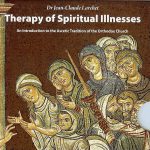A vast synthesis of patristic and ascetic oriental teachings from the 1st to 14th centuries, this study presents a renewed vision of the Christian doctrine of salvation and constitutes a veritable treaty, both theoretical and practical, of spiritual psychology and medicine, as well as a summation of Orthodox spirituality that has no equivalent.
The notion of human health held by Orthodox anthropology is inseparable from that of the ideal human nature possessed by the original Adam. Before being led astray, this nature was a synergy of Adam’s free will and of divine grace unto his perfection, i.e. deification . That is to say, human nature has a direction found in its different components: it is naturally oriented towards God and is destined to find fulfilment in Him.
Dr Larchet shows how, according to Orthodox ascetical anthropology, man is in a healthful state when he achieves his destiny and when his faculties exert themselves in accordance with this natural aim. He shows, also, how sin, thought of as separation from being with God, establishes in man a manifold state of illness by turning him away from his essential goal . . . One sees from this how theanthropic asceticism, by which man is ontologically converted, constitutes a true therapy, in that such asceticism permits man to turn away from this pathological and unnatural state and to recover the health of his original nature by turning towards God.
If Christ appears as a physician and the salvation He brings appears as healing, it is because humanity is ill. Beholding mankind’s healthfulness in the primordial state of Adam, the Fathers and all of Tradition see the state of sin, which characterizes fallen mankind after the original sin, as a state of manifold illness affecting man in his whole being.
This notion of mankind as sick from sin finds scriptural support, which the Fathers did not fail to use. In the example of the Prophets, the Fathers call to mind the inability of the men of the Old Covenant to find a remedy for their ailments, however serious these were, and their calling to God throughout the generations. God’s favorable response to this call was the Incarnation of the Word, Who alone could affect the awaited healing because He was God.
In any case, “Orthodox psychotherapy”was accepted by scholars, as demonstrated in the voluminous book titled Manual of Psychotherapy and Religious Diversity, published by the American Psychological Society. The book describes therapies offered by religions. In a chapter titled “Psychotherapy With Eastern Orthodox Christians’; written by Tony Young, there is extensive reference to the psychotherapy offered by the Orthodox Church and the calming effects deriving from Confession and the Jesus Prayer recited in the heart.
